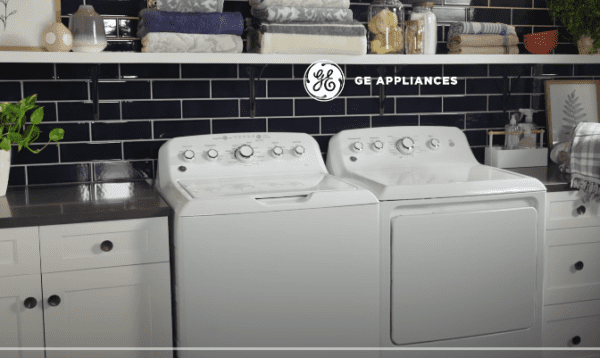If your GE washing machine is making a clicking noise during agitation, it can certainly raise anxiety about the possibility of a hefty repair bill or even a replacement.
But, worry not! This odd noise can be a result of multiple causes, many of which you can troubleshoot and fix yourself.
In this guide, we will explore 15 common reasons for the unexpected sound.
With this information, we hope to demystify your washing machine woes and help you solve the problem efficiently.
GE Washer Clicking Noise During Agitation

1. Damaged Motor Coupling
Cause
The motor coupling is a critical component of a GE washer that connects the motor to the transmission.
If it becomes damaged or worn out, it may cause a clicking noise during the agitation cycle.
This noise is a symptom of the motor struggling to transfer power to the transmission, which can be exacerbated by heavy loads or prolonged use.
Solution
For a damaged motor coupling, replacement is typically the most effective solution.
Unplug the washer, disconnect the hoses, and carefully move the appliance away from the wall.
Remove the cabinet to access the motor coupling. If it appears damaged or worn, replace it with a new one.
Always consult your washer’s manual for specific instructions, or consider hiring a professional if you’re not comfortable performing this repair yourself.
2. Worn Out Drive Belt
Cause
A worn-out drive belt often produces a distinct clicking noise during the agitation cycle of a GE washer.
This usually happens when the belt, which connects the motor to the agitator, becomes worn out or damaged over time due to regular use.
Solution
The solution to a worn-out drive belt is simple – replacement.
You should disconnect the washer from the power source, remove the back panel, and replace the old belt with a new one.
Always ensure to use a GE-specific drive belt for compatibility and optimal performance.
3. Faulty Agitator Components
Cause
The “clicking” noise during agitation could be attributed to the worn out or damaged agitator components of your GE washer.
The agitator is the part of the washer that moves the clothes through the water and detergent.
Over time, some of its components such as the gears, coupler or the drive block can wear down or break, leading to a clicking sound when the washer agitates.
Solution
To resolve this issue, begin by inspecting the agitator components for visible signs of wear or damage.
If any parts appear worn or broken, they should be replaced. Parts such as the agitator coupler and the drive block are usually the cause and can be replaced relatively easily.
However, if you are unsure of the process or if the issue persists after replacing the parts, it is recommended to seek the help of a professional appliance repair service.
4. Broken Drive Pulley
Cause
A broken drive pulley can be the culprit behind a clicking noise during agitation in your GE Washer.
The drive pulley connects the washer’s drive motor to the drive belt and agitates the washer’s drum.
Over time, this component can suffer from wear and tear or get damaged, causing a disruptive clicking noise during the agitation cycle.
Solution
To rectify this issue, the drive pulley would need to be replaced. It’s highly recommended to engage a professional technician due to the complexity of the task.
They will need to disconnect the washer from the power supply, remove the drive belt, and then replace the damaged drive pulley.
After the new pulley is installed, the drive belt is reattached, and the power supply is restored, putting an end to the unsettling clicking noise during agitation.
5. Damaged Transmission
Cause
A damaged transmission can be a possible cause of the clicking noise during agitation in a GE washer.
The transmission is the component responsible for changing the washer’s movements from agitate to spin.
If this part is damaged, it may fail to smoothly transition between these operation modes, thereby creating a clicking or clattering sound.
Solution
The solution to a damaged transmission typically involves replacing the entire part, as repairing individual components can be complex and often not cost-effective.
Always ensure that the replacement part is compatible with your specific GE washer model.
For safety and precision, it is recommended to seek the assistance of a professional appliance repair technician to carry out this task.
6. Loose Hub Nut
Cause
A common cause of a clicking noise during the agitation cycle of a GE washer is a loose hub nut.
The hub nut secures the inner tub to the transmission. If the hub nut becomes loose, the tub might wobble or make unusual noises, such as clicking, during agitation.
Solution
Tightening the loose hub nut is the most straightforward solution.
First, remove the agitator to access the hub nut. Using a spanner wrench, tighten the hub nut securely.
Be careful not to over-tighten as this could damage the tub. If the problem persists after tightening, it might be necessary to replace the hub nut altogether.
Always unplug the washer before performing any maintenance or repairs.
7. Malfunctioning Mode Shifter
Cause
The clicking noise in your GE washer during agitation could be due to a malfunctioning mode shifter.
The mode shifter, an integral part of the washing machine, is responsible for switching the washer’s drum between the agitation and spin cycles.
If this component is damaged or faulty, it may make unusual sounds, like clicking, when the washer shifts modes.
Solution
The solution for a malfunctioning mode shifter typically involves replacement.
This task should be performed by a qualified technician. It’s important to ensure the replacement part is compatible with your specific GE washer model.
After the replacement, the clicking noise should be resolved, allowing your washer to operate quietly and efficiently again.
8. Defective Rotor Position Sensor
Cause
The Rotor Position Sensor (RPS) in a GE washer plays a vital role in sensing the speed and direction of the motor.
If the RPS is defective, the washer might produce a clicking noise during agitation.
This happens because the sensor is unable to correctly ascertain the motor’s position, leading to an irregular spin and unsettling noise.
Solution
To resolve this issue, the defective RPS should be replaced. It’s advisable to have a trained professional perform this task to ensure accuracy and safety.
They will typically test the sensor first to confirm the fault before replacing it with a new one.
After replacement, the washer should operate without the clicking noise, indicating a successful repair.
9. Faulty Clutch Assembly
Cause
Clicking noise during agitation often indicates an issue with the washer’s clutch assembly.
This clutch assembly is a critical component that connects the transmission to the inner washer tub.
It allows the tub to spin at various speeds. If the clutch is worn out or damaged, it may create an unusual clicking or grinding noise during the agitation cycle.
Solution
The solution to a faulty clutch assembly involves replacing it.
This task can be a bit complex, so it’s recommended that you enlist the services of a professional appliance repair technician.
They have the necessary tools and experience to remove the old clutch assembly and install a new one correctly, ensuring your washer operates smoothly and quietly.
10. Broken Suspension Rods
Cause
The primary purpose of the suspension rods in your GE washer is to support the inner tub.
Clicking noise during agitation could be an indicator of broken or worn-out suspension rods.
The rods absorb vibrations and movements of the tub while the machine is running.
When these rods are broken, they fail to support the tub effectively, leading to unusual noises like clicks during the agitation phase.
Solution
Replacing the broken suspension rods is the most effective solution to this problem.
Firstly, ensure to unplug the washer and disconnect the water supply. Remove the top cover of the washer to access the suspension rods.
Observe any visible signs of wear or damage. If the rods are broken or worn out, replace them with new ones.
After replacing the rods, reconnect the water supply, plug in the washer, and run a test cycle to ensure the clicking noise has stopped.
Please note, it’s always advisable to hire a professional technician if you are not familiar with washer repairs.
11. Damaged Drive Shaft
Cause
Clicking noise during the agitation cycle in your GE Washer may be a symptom of a damaged drive shaft.
The drive shaft is a critical component, connecting the machine’s tub to the motor.
When it’s damaged or worn out, it can fail to engage correctly, leading to abnormal or loud noises during the wash cycle.
Solution
The solution to a damaged drive shaft is typically a replacement. It’s a complex task and may require professional expertise to ensure it’s done correctly.
However, if you’re experienced in appliance repair, you can order the replacement part from a certified GE parts dealer and replace it following the manufacturer’s instructions.
Always remember to disconnect the washer from the power source before starting any repair.
12. Out Of Balance Load
Cause
An out-of-balance load is often the culprit behind a GE washer producing a clicking noise during agitation.
This usually occurs when the laundry inside the washing machine is not evenly distributed.
The imbalanced load can cause the tub to spin asymmetrically, resulting in a clicking noise as it hits the sides of the washer.
Solution
The solution is relatively straightforward. Pause the washer, open the door, and manually redistribute the clothing evenly around the tub.
This should ensure a balanced load. If the clicking noise persists after this, it might be time to call in a technician as the issue could be more than just an imbalanced load.
13. Faulty Timer Knob
Cause
The timer knob can become faulty due to prolonged use or if it has been forced turned.
This can cause the internal components of the knob to break, which in turn might result in an unusual clicking noise during the agitation cycle.
Solution
The solution to this problem is relatively straightforward.
You will need to replace the faulty timer knob with a new one.
Disconnect the washer from the power source first, remove the old knob and replace it with the new one.
Make sure to consult with your washer’s manual for specific instructions regarding the replacement of the timer knob.
14. Broken Washer Lid Switch
Cause
A persisting, abnormal clicking noise during the agitation process could be indicative of a broken washer lid switch.
This safety component ensures the washer only operates when the lid is securely closed.
However, over time and with continuous use, the switch can wear out or break, interfering with normal washer operation.
Solution
If your washer lid switch is faulty, the most effective solution is to replace it.
This process typically requires a professional technician due to the complexity of most washer models.
They’ll be able to safely disassemble your machine, install a new switch, and test the washer to ensure the issue is resolved.
Always remember to disconnect the washer from the power source before performing any maintenance tasks.
15. Worn Out Bearings
Cause
A common cause of clicking noises during the agitation cycle in a GE washer can be attributed to worn-out bearings.
Bearings are essential components that support the drum, allowing it to rotate smoothly during operation.
Over time, these bearings can wear out due to repeated use and load, leading to the creation of unusual noises, including clicking sounds.
Solution
To rectify the situation caused by worn-out bearings, it is often necessary to replace them.
This task can be moderately complex, requiring the appliance to be partially dismantled to reach the bearings.
Hence, it is advisable to hire a professional appliance repair service for this job.
They have the necessary tools and expertise to perform the replacement accurately and safely, ensuring the long-term performance of your washer.
Conclusion
In conclusion, a GE Washer making a clicking noise during agitation can be quite concerning, but it doesn’t always signal a catastrophic problem.
The noise could be as simple as a loose agitator or something more complex like a problematic transmission.
It’s crucial to investigate promptly to prevent further potential damage. This investigation may involve visual inspections, checking the drive belt, agitator, and drive motor, or even calling a professional if necessary.
Rest assured, most issues are solvable with the right approach and expertise.
FAQs
Why is my GE washer making a clicking noise?
Your GE washer might be making a clicking noise due to a faulty agitator coupler or a worn-out drive belt.
These components can wear over time, causing unusual noises during operation.
Why does my washing machine click when agitating?
The clicking noise from your washing machine when agitating could be due to a broken or loose agitator, or possibly a worn drive belt.
These parts can deteriorate with use, leading to unusual sounds.
Why does my LG washing machine make noise when agitating?
Your LG washing machine might make noise when agitating if the drum bearings are damaged or if there is a problem with the drive pulley.
These parts can wear down with time and frequent usage.
Why is my washer not agitating but spinning?
Your washer might not be agitating but spinning due to a faulty or broken motor coupling, which can prevent the agitator from moving while the spin cycle operates normally.
Kenmore Washer Lid Lock Flashing
Why Is My New Whirlpool Washer So Loud
Dryer Taking Multiple Cycles to Dry
Kenmore Dryer Keeps Shutting Off
Samsung Washing Machine No Power No Lights
Amana Dryer Stopped Working Mid Cycle
Whirlpool Washer Door Locked Flashing and Pump Running
Whirlpool Washer Not Agitating Properly
Whirlpool Washer Won’t Agitate but Will Spin
Whirlpool Washer Locked Light Flashing
What Causes a Washing Machine Pump to Break
Whirlpool Washer Stops Mid Cycle
Front Load Washer Filling With Water When Off
Why Is My Amana Washer Stuck on Wash Cycle
Washing Machine High-Pitched Noise
GE Washer Blinking Green Light


